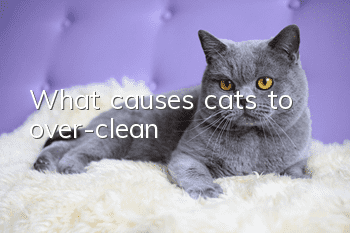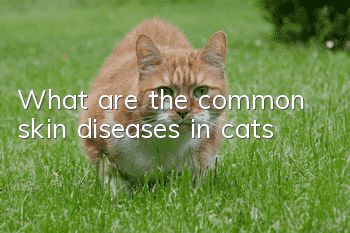What causes cats to over-clean?

We all know that cats are very clean species, which is why they are so popular as family pets. Statistically, cats typically spend up to 50% of their waking hours cleaning themselves, but anything more than that—what we call overcleaning—can turn into a destructive habit.
Although cleaning is good, excessive cleaning will cause certain destructive power to the cat itself. Let’s first understand the reasons why cats clean excessively and what measures can be taken.
Know the signs of over-cleaning in cats
Self-cleaning is an important skill that helps cats remove loose hair, dirt, and parasites from their coat. But excessive licking and biting may mean your pet's self-cleaning habits are becoming a problem.
An important consequence of over-cleaning is hair loss, which can occur in the back, belly or inner leg bands. This pattern of fur removal is called "fur mowing," and the affected area may be completely exposed. Meanwhile, an unusually high number of hairballs can be another sign that your cat is over-cleaning.
What causes cats to over-clean?
So, what is the cause of over-cleaning?
1. Allergy or infection
Irritated skin may be due to an infection or the cat is allergic to certain foods, parasites, or substances in the environment. Your cat’s external symptoms may hint at the source of the problem:
Flea allergy: irritation at the base of the tail
Ear mites: hair loss and scabs on neck and ears
Allergic reaction to pollen: excessive chewing of paws
2. Pain
Excessive cleaning may also be a sign that your cat is experiencing pain or discomfort, especially if it handles a certain area of its body repeatedly.
For example, disc disease can cause back pain and cause a cat to over-clean an area of the back, while a urinary tract infection or anal sac impaction may stimulate over-cleaning of the genital or perianal area.
3. Stress or boredom
Some cats use excessive cleaning as a way to cope with stress or boredom.
According to research, licking helps release anxiety-reducing endorphins, so if a stressed cat feels relieved when licking its fur, it will become a habit.
Compulsive alopecia, also known as psychogenic alopecia, is usually caused by changes in the cat's daily life or environment, such asSuch as moving to a new house or the arrival of a new family member (human or pet) - cats are very sensitive. In these cases, self-cleansing can help make up for a lack of mental or physical stimulation.
Breed-wise, this condition can be seen in any breed, but is most common in Oriental cat breeds, including Siamese, Abyssinian, Burmese, and Himalayan cats.
How to help a cat that overcleans
As with any other problem, the key to over-cleaning is to deal with the root cause. A veterinarian can make a diagnosis and provide medical treatment or advice to stop this behavioral habit.
1. Establish the root cause
First, a veterinarian needs to diagnose and treat the problem. Infections or allergies can be treated with appropriate medications, including antibiotics, antihistamines, and more.
2. Maintain regularity
Cats like routine, so try to create a comfortable environment and a strictly enforced schedule. Changes can also be introduced gradually, such as new pets or lifestyle habits, to reduce stress on your cat.
3. Provide mental and physical stimulation
Provide toys and a good environment for cats. This will help build your cat's confidence and provide a distraction.
4. Try calming medications/supplements
Cats with persistent anxiety can be given anti-anxiety medications or supplements, which can be provided in the form of treats. Also try sprays and insert diffusers that disperse synthetic cat pheromones, but as with medications, always check with your veterinarian before use.
5. Wait patiently
Finally, the most important way to mitigate over-cleaning is to be patient.
Tell guests not to punish or try to interfere if they see their cat cleaning excessively. This will only increase your cat's stress and make his over-cleaning problem worse.
With veterinary help, it may take about a month for excessive cleaning behavior to return to normal, and longer for hair to return to normal.
Article source: www.petmd.com
Original author: Dr. Natalie Stilwell
Recommended Good Things
Aineng Pet Odor Eliminating Disinfectant can effectively remove body odor/feces odor and other odor molecules! Effective in treating skin diseases caused by fungi/bacteria! Can kill parvovirus/canine distemper virus/coronavirusetc!
It is edible grade for pets, does not contain fragrances, does not contain chemicals, can be sprayed directly, and is harmless to human pets!
Consultation: 13028809308 (WeChat synchronization)
Scan the QR code on WeChat to enter the purchase
- Kitten has soft poop but is in good spirits
- Can cats eat raw fish?
- What are the symptoms and manifestations of postpartum depression in cats?
- What causes tears in cats?
- How to tell if Garfield is pregnant
- Why do kittens get ringworm?
- Why is a cat too thin?
- Is it okay for cats to bask in the sun through glass?
- Are Siamese cats afraid of the cold in winter?
- Why is cat urine red?



